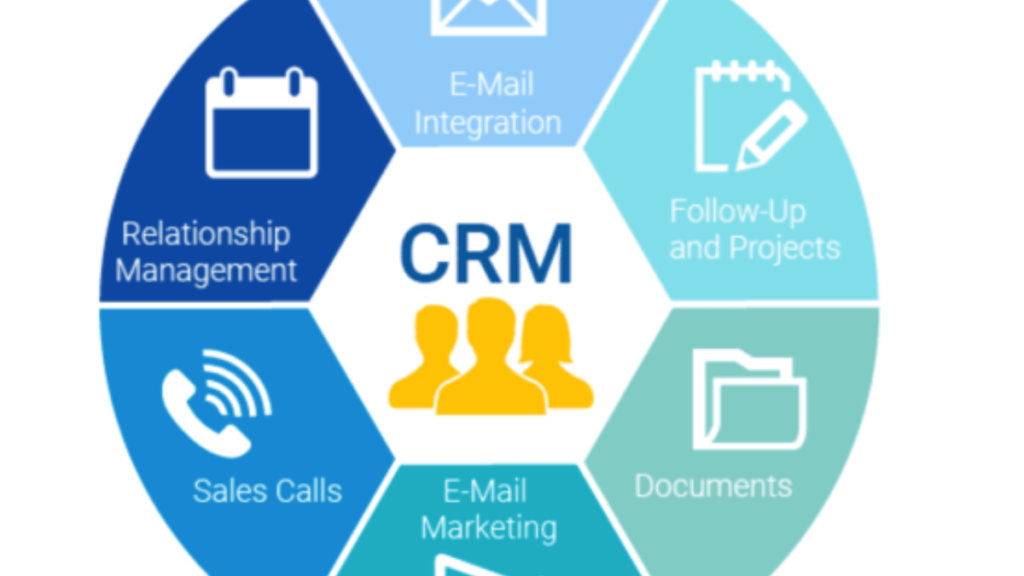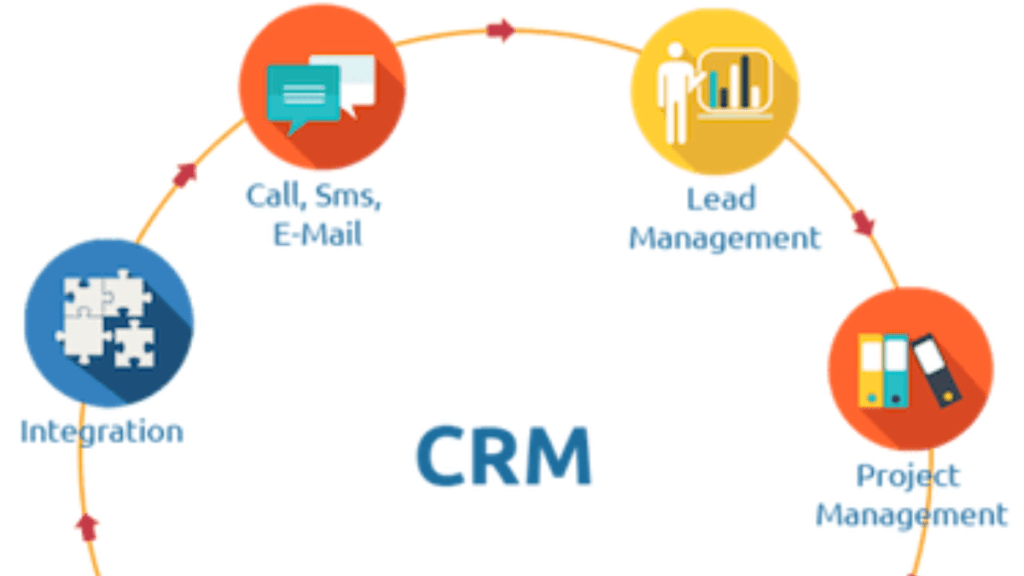Customer Relationship Management for Small Businesses: Boosting Success and Growth
Customer Relationship Management for Small Businesses Customer relationship management (CRM) is a crucial component for small businesses striving to build strong customer connections, improve operational efficiency, and drive business growth. In today’s highly competitive market, businesses that prioritize customer relationships are more likely to thrive and succeed. This article explores the benefits of CRM for small businesses, provides guidance on choosing the right CRM system, offers implementation best practices, and addresses common challenges. Read on to discover how CRM can transform your small business and propel it toward long-term success.
Benefits of CRM for Small Businesses

Implementing a CRM system brings numerous advantages that can significantly impact a small business’s bottom line. Let’s delve into some key benefits:
Improved customer retention and loyalty
Customer Relationship Management for Small Businesses : One of the primary goals of CRM is to strengthen customer relationships and enhance satisfaction. By centralizing customer data, a CRM system enables businesses to understand their customers better, personalize interactions, and deliver exceptional experiences. This heightened level of service fosters loyalty and encourages customers to choose your business over competitors. Additionally, CRM helps identify valuable customers, allowing businesses to tailor special offers or rewards, further nurturing long-term loyalty.
Enhanced customer communication and engagement
Customer Relationship Management for Small Businesses : Effective communication is vital for any business, and CRM facilitates seamless and targeted interactions with customers. By integrating communication channels like email, phone, and social media within the CRM system, businesses can streamline their communication efforts and ensure consistent messaging. CRM tools also enable personalized communication by leveraging customer data, such as purchase history, preferences, and demographics. This personalized approach enhances customer engagement, increases response rates, and boosts overall customer satisfaction.
Streamlined sales and marketing processes

Customer Relationship Management for Small Businesses : CRM systems provide robust sales and marketing capabilities, empowering small businesses to streamline their processes and achieve higher efficiency. With CRM, businesses can automate tasks such as lead generation, contact management, and follow-ups, freeing up valuable time for sales teams. Furthermore, CRM tools offer comprehensive
reporting and analytics, allowing businesses to track sales performance, monitor marketing campaigns, and gain valuable insights into customer behavior. By automating repetitive tasks and gaining deeper visibility into sales and marketing activities, small businesses can optimize their operations, improve productivity, and ultimately drive revenue growth.
Effective customer data management
Customer Relationship Management for Small Businesses : In today’s data-driven world, managing customer information is essential for small businesses. CRM systems serve as centralized repositories for customer data, enabling businesses to capture, organize, and analyze valuable information. This includes customer contact details, purchase history, communication history, and preferences. By having a comprehensive view of customer data, businesses can make informed decisions, tailor their offerings, and deliver targeted marketing campaigns. Furthermore, CRM systems facilitate data segmentation, allowing businesses to identify customer segments and create personalized marketing strategies.
Choosing the Right CRM System for Small Businesses
Customer Relationship Management for Small Businesses : Selecting the most suitable CRM system is crucial for small businesses to maximize the benefits and ensure a successful implementation. Here are some key considerations:
Assessing business needs and goals

Before embarking on the CRM selection process, it’s important to assess your business needs, goals, and specific requirements. Consider the size of your business, industry, customer base, and growth projections. Identify the pain points you want to address with CRM and define the outcomes you expect to achieve. This assessment will help you determine the essential features, functionalities, and integrations your CRM system should have.
Evaluating available CRM options
There are various CRM options available in the market, ranging from basic to advanced solutions. It’s crucial to evaluate different CRM providers based on your business needs, budget, and scalability. Look for user-friendly interfaces, customization options, mobile accessibility, and customer support. Read reviews, seek recommendations, and request demos or trial periods to experience the CRM system firsthand. Pay attention to factors such as data security, system reliability, and ease of integration with existing business tools.
Considering scalability and integration
As your business grows,
so will your customer
base and data volume. Therefore, it’s essential to choose a CRM system that can scale along with your business. Consider the system’s capacity to accommodate growing data, users, and additional features. Additionally, assess the system’s integration capabilities with other essential tools you use, such as email marketing platforms, social media management tools, or project management systems. Seamless integration ensures efficient data flow and enhances overall operational efficiency.
Implementing CRM in a Small Business
Once you’ve selected the appropriate CRM system for your small business, it’s time to implement it effectively. Successful implementation involves several key steps:
Defining CRM strategies and objectives

Before implementing CRM, establish clear strategies and objectives aligned with your business goals. Identify the specific outcomes you aim to achieve, whether it’s improving customer satisfaction, increasing sales, or enhancing marketing effectiveness. Define key performance indicators (KPIs) that will help you measure the success of your CRM implementation. A well-defined strategy sets the foundation for a successful CRM adoption and ensures that all stakeholders are aligned with the objectives.
Training employees and fostering adoption
Introducing a CRM system requires proper training for your employees to ensure smooth adoption and utilization. Provide comprehensive training sessions that cover the system’s features, functionalities, and benefits. Encourage active participation, address concerns, and emphasize the positive impact of CRM on their daily work. Foster a culture of collaboration and communication to ensure that employees embrace the CRM system and understand its value in achieving business objectives.
Integrating CRM into existing systems
To fully leverage the power of CRM, it’s essential to integrate it seamlessly with your existing systems and processes. Whether it’s your sales pipeline, marketing automation tools, or customer service platforms, ensure that the CRM system can synchronize data effectively. Integrating CRM with existing systems eliminates data
Customer relationship management (CRM) is a crucial component for small businesses striving to build strong customer connections, improve operational efficiency, and drive business growth. In today’s highly competitive market, businesses that prioritize customer relationships are more likely to thrive and succeed. This article explores the benefits of CRM for small businesses, provides guidance on choosing the right CRM system, offers implementation best practices, and addresses common challenges. Read on to discover how CRM can transform your small business and propel it toward long-term success.
Benefits of CRM for Small Businesses

Implementing a CRM system brings numerous advantages that can significantly impact a small business’s bottom line. Let’s delve into some key benefits:
Improved customer retention and loyalty
Customer Relationship Management for Small Businesses : One of the primary goals of CRM is to strengthen customer relationships and enhance satisfaction. By centralizing customer data, a CRM system enables businesses to understand their customers better, personalize interactions, and deliver exceptional experiences. This heightened level of service fosters loyalty and encourages customers to choose your business over competitors. Additionally, CRM helps identify valuable customers, allowing businesses to tailor special offers or rewards, further nurturing long-term loyalty.
Enhanced customer communication and engagement
Customer Relationship Management for Small Businesses : Effective communication is vital for any business, and CRM facilitates seamless and targeted interactions with customers. By integrating communication channels like email, phone, and social media within the CRM system, businesses can streamline their communication efforts and ensure consistent messaging. CRM tools also enable personalized communication by leveraging customer data, such as purchase history, preferences, and demographics. This personalized approach enhances customer engagement, increases response rates, and boosts overall customer satisfaction.
Streamlined sales and marketing processes
CRM systems provide robust sales and marketing capabilities, empowering small businesses to streamline their processes and achieve higher efficiency. With CRM, businesses can automate tasks such as lead generation, contact management, and follow-ups, freeing up valuable time for sales teams. Furthermore, CRM tools offer comprehensive
reporting and analytics, allowing businesses to track sales performance, monitor marketing campaigns, and gain valuable insights into customer behavior. By automating repetitive tasks and gaining deeper visibility into sales and marketing activities, small businesses can optimize their operations, improve productivity, and ultimately drive revenue growth.
Effective customer data management
Customer Relationship Management for Small Businesses : In today’s data-driven world, managing customer information is essential for small businesses. CRM systems serve as centralized repositories for customer data, enabling businesses to capture, organize, and analyze valuable information. This includes customer contact details, purchase history, communication history, and preferences. By having a comprehensive view of customer data, businesses can make informed decisions, tailor their offerings, and deliver targeted marketing campaigns. Furthermore, CRM systems facilitate data segmentation, allowing businesses to identify customer segments and create personalized marketing strategies.
Choosing the Right CRM System for Small Businesses
Selecting the most suitable CRM system is crucial for small businesses to maximize the benefits and ensure a successful implementation. Here are some key considerations:
Assessing business needs and goals
Customer Relationship Management for Small Businesses : Before embarking on the CRM selection process, it’s important to assess your business needs, goals, and specific requirements. Consider the size of your business, industry, customer base, and growth projections. Identify the pain points you want to address with CRM and define the outcomes you expect to achieve. This assessment will help you determine the essential features, functionalities, and integrations your CRM system should have.
Evaluating available CRM options
Customer Relationship Management for Small Businesses : There are various CRM options available in the market, ranging from basic to advanced solutions. It’s crucial to evaluate different CRM providers based on your business needs, budget, and scalability. Look for user-friendly interfaces, customization options, mobile accessibility, and customer support. Read reviews, seek recommendations, and request demos or trial periods to experience the CRM system firsthand. Pay attention to factors such as data security, system reliability, and ease of integration with existing business tools.
Considering scalability and integration
Customer Relationship Management for Small Businesses As your business grows,
so will your customer
base and data volume. Therefore, it’s essential to choose a CRM system that can scale along with your business. Consider the system’s capacity to accommodate growing data, users, and additional features. Additionally, assess the system’s integrations.
on capabilities with other essential tools you use, such as email marketing platforms, social media management tools, or project management systems. Seamless integration ensures efficient data flow and enhances overall operational efficiency.
Implementing CRM in a Small Business
Customer Relationship Management for Small Businesses : Once you’ve selected the appropriate CRM system for your small business, it’s time to implement it effectively. Successful implementation involves several key steps:
Defining CRM strategies and objectives
Customer Relationship Management for Small Businesses Before implementing CRM, establish clear strategies and objectives aligned with your business goals. Identify the specific outcomes you aim to achieve, whether it’s improving customer satisfaction, increasing sales, or enhancing marketing effectiveness. Define key performance indicators (KPIs) that will help you measure the success of your CRM implementation. A well-defined strategy sets the foundation for a successful CRM adoption and ensures that all stakeholders are aligned with the objectives.
Training employees and fostering adoption
Customer Relationship Management for Small Businesses : Introducing a CRM system requires proper training for your employees to ensure smooth adoption and utilization. Provide comprehensive training sessions that cover the system’s features, functionalities, and benefits. Encourage active participation, address concerns, and emphasize the positive impact of CRM on their daily work. Foster a culture of collaboration and communication to ensure that employees embrace the CRM system and understand its value in achieving business objectives.
Integrating CRM into existing systems
Customer Relationship Management for Small Businesses : To fully leverage the power of CRM, it’s essential to integrate it seamlessly with your existing systems and processes. Whether it’s your sales pipeline, marketing automation tools, or customer service platforms, ensure that the CRM system can synchronize data effectively. Integrating CRM with existing systems eliminates data
Implementing a CRM system in a small business may come with cost and resource limitations. To overcome these challenges,
consider the following:
Identify affordable CRM options for small businesses
Customer Relationship Management for Small Businesses While some CRM systems can be costly, there are affordable options specifically designed for small businesses. Research and compare different CRM providers to find a solution that fits your budget without compromising on essential features. Look for pricing models that align with your business needs, such as monthly subscriptions or pay-as-you-go plans. Some CRM vendors also offer discounted packages for small businesses, so explore these options to find the best value for your investment.
Prioritize essential features and scalability
Customer Relationship Management for Small Businesses : Focus on the core features that are essential to your business needs and prioritize those during the CRM selection process. By narrowing down your requirements, you can choose a system that aligns with your budget and resource limitations. Additionally,
consider the scalability of
the CRM system. Select a solution that allows you to start small and grow as your business expands. This ensures that you can scale your CRM capabilities without incurring significant additional costs.
Leverage resources and expertise
If you have limited internal resources or expertise in CRM implementation, consider leveraging external resources. Hire a CRM consultant or work with a CRM implementation partner who can provide guidance and support throughout the process. They can help you navigate challenges, optimize system configuration, and ensure a smooth implementation. Outsourcing CRM implementation can be a cost-effective solution that ensures you make the most of your investment while reducing the burden on your internal team.
Foster a culture of continuous improvement
Customer Relationship Management for Small Businesses Successful CRM implementation is
an ongoing process that requires
continuous improvement. Encourage feedback from your employees, customers, and stakeholders to identify areas for enhancement. Regularly review your CRM processes, workflows, and data management protocols to identify any bottlenecks or inefficiencies. Stay up to date with industry trends and new CRM features that could further enhance your customer relationships and operational efficiency. By fostering a culture of continuous improvement, you can overcome limitations and optimize your CRM implementation.
CRM Integration with Other Business Tools
Customer Relationship Management for Small Businesses : CRM systems can integrate with various other business tools to further enhance your operational efficiency and effectiveness. Here are some common integrations:
CRM and email marketing platforms
Customer Relationship Management for Small Businesses Integrating your CRM system with an email marketing platform allows you to streamline your email campaigns, track engagement, and measure the success of your marketing efforts. By syncing customer data between CRM and email marketing platforms, you can create targeted email lists, personalize email content, and track email performance metrics. This integration ensures a seamless flow of data and enables you to nurture customer relationships through personalized and timely email communication.
CRM and social media management
Customer Relationship Management for Small Businesses : Integrating your CRM system with social media management tools helps you leverage social media data to enhance customer interactions. By syncing social media profiles with CRM, you can capture valuable information about customer preferences, interests, and behaviors. This integration allows you to engage with customers on social media platforms, respond to inquiries, and track social media interactions within the CRM system. By incorporating social media data into your CRM strategy, you can develop more personalized and targeted marketing campaigns.
CRM and project management systems
Customer Relationship Management for Small Businesses : Integrating CRM with project management systems provides a holistic view of customer interactions and project status. By linking CRM data with project management tools, you can track customer communications, tasks, and milestones associated with specific projects. This integration streamlines project-related workflows, improves collaboration between sales, marketing, and project teams, and ensures that customer-centric projects are executed efficiently. It also enables you to analyze project success in the context of customer relationships.
Measuring the Success of CRM Implementation
Measuring the success of your CRM implementation is crucial to understanding the impact it has on your business. Here are some key areas to evaluate:
Key performance indicators (KPIs) for CRM success
Customer Relationship Management for Small Businesses : Defining and tracking key performance indicators (KPIs) helps you measure the success of your CRM implementation. Consider the following KPIs:
Customer Acquisition: Measure the number of new customers gained through your CRM efforts. This metric helps you assess the effectiveness of your marketing and sales strategies in attracting and converting leads.
Customer Retention: Track customer retention rates to determine how well your CRM system helps you retain existing customers. A high retention rate indicates that your CRM efforts are fostering strong customer relationships and loyalty.
Sales Conversion Rate: Monitor the percentage of leads or prospects that convert into paying customers. This metric reflects the effectiveness of your sales processes and the impact of CRM on your sales pipeline.
Customer Satisfaction: Regularly survey your customers to gauge their satisfaction levels. This feedback provides insights into the quality of customer interactions facilitated by your CRM system.
Customer Lifetime Value (CLV): Calculate the CLV to assess the long-term value generated by your customer relationships. CRM can help you track customer purchases, repeat business, and upsell or cross-sell opportunities, contributing to higher CLV.
Return on Investment (ROI): Evaluate the financial impact of your CRM implementation by comparing the costs incurred with the benefits achieved. This includes increased sales, improved customer retention, and reduced operational costs.
Conducting user feedback and surveys
Customer Relationship Management for Small Businesses : Collecting feedback from CRM users within your organization is vital to understanding the system’s usability and effectiveness. Conduct surveys or interviews to gather insights on user satisfaction, ease of use, and the impact of CRM on their daily tasks. User feedback helps identify areas of improvement, uncover training needs, and address any challenges or frustrations users may encounter. Regularly assess user feedback to make iterative improvements to your CRM implementation.
Analyzing customer feedback and sentiment
Customer Relationship Management for Small Businesses : In addition to internal user feedback, analyze customer feedback and sentiment regarding their interactions with your business. Monitor customer support tickets, reviews, and social media mentions to gauge customer satisfaction and sentiment. Use sentiment analysis tools to identify positive and negative trends, allowing you to make data-driven decisions and take corrective actions where necessary.
Comparing pre- and post-implementation metrics
Customer Relationship Management for Small Businesses : To understand the impact of CRM on your business, compare key metrics and performance indicators before and after implementation. This analysis allows you to quantify improvements in sales, customer satisfaction, customer retention, and other relevant areas. By comparing these metrics over time, you can track the progress and effectiveness of your CRM system.
Continuous improvement and optimization
Customer Relationship Management for Small Businesses : CRM implementation is an ongoing process. Regularly review and evaluate the performance of your CRM system to identify areas for improvement and optimization. Leverage CRM reporting and analytics features to gain insights into customer behavior, sales trends, and marketing campaign effectiveness. Use these insights to refine your CRM strategies, customize workflows, and enhance customer experiences. Continually iterate and optimize your CRM implementation to drive continuous improvement and achieve better results.
Conclusion
Customer Relationship Management for Small Businesses : Implementing a customer relationship management (CRM) system in a small business can significantly improve customer interactions, sales processes, and overall business performance. By centralizing customer data, automating tasks, and enabling targeted marketing efforts, CRM systems empower small businesses to enhance customer relationships, drive sales growth, and stay competitive in today’s dynamic marketplace.
When selecting a CRM system, carefully evaluate your business needs, consider affordability and scalability, and prioritize essential features. Effectively implementing CRM requires aligning strategies, providing comprehensive training, and integrating the system with existing tools and processes. Overcoming challenges such as resistance to change and resource limitations is possible through employee buy-in, external expertise, and fostering a culture of continuous improvement.
To measure the success of your CRM implementation, establish key performance indicators (KPIs) and regularly monitor and analyze the data. Some additional KPIs to consider are:
Average Response Time: Measure the average time it takes for your team to respond to customer inquiries or requests. A low response time indicates efficient customer service and a high level of engagement.
Customer Complaint Resolution Time: Monitor the time it takes for your team to address and resolve customer complaints. A shorter resolution time demonstrates your commitment to customer satisfaction and service quality.
Upsell/Cross-sell Rate: Measure the success of upselling or cross-selling efforts by tracking the percentage of customers who make additional purchases. This metric reflects the effectiveness of your CRM system in identifying and capitalizing on upselling opportunities.
Customer Churn Rate: Calculate the rate at which customers discontinue using your products or services. A lower churn rate indicates stronger customer relationships and higher customer retention.
Sales Funnel Conversion Rate: Evaluate the effectiveness of your sales funnel by measuring the conversion rates at each stage, from lead generation to closing a sale. This helps you identify areas for improvement and optimize your sales processes.
In addition to these KPIs, it’s important to gather qualitative feedback from both customers and employees. Conduct surveys, interviews, or focus groups to gain insights into their experiences with the CRM system. This feedback can uncover specific pain points, feature requests, or areas where additional training and support are needed.
By regularly reviewing and analyzing the collected data, you can identify trends, patterns, and opportunities for improvement. Use these insights to make data-driven decisions, refine your CRM strategies, and enhance the overall customer experience.
FAQs
Customer Relationship Management for Small Businesses : Here are some common questions about CRM implementation in small businesses:
1. What are the key benefits of implementing a CRM system in a small business?
Customer Relationship Management for Small Businesses A CRM system provides numerous benefits for small businesses, including improved customer relationships, streamlined sales processes, enhanced marketing efforts, increased productivity, better data management, and the ability to make data-driven decisions.
2. How long does it take to implement a CRM system in a small business?
Customer Relationship Management for Small Businesses The time required for CRM implementation depends on various factors such as the complexity of your business processes, the size of your customer database, the level of customization needed, and the availability of resources
3. Can a small business afford a CRM system?
Yes, there are CRM solutions available that cater specifically to the needs and budgets of small businesses. Many CRM vendors offer flexible pricing plans, including affordable subscription models or pay-as-you-go options, making CRM systems accessible to small businesses.
4. What kind of training is necessary for employees using a CRM system?
Training is essential to ensure that employees understand how to effectively use the CRM system. This may include initial training sessions, ongoing support, and access to educational resources. It’s important to provide training tailored to different roles and responsibilities within the organization.
5. How can I ensure data security and privacy when using a CRM system?
Customer Relationship Management for Small Businesses : To ensure data security and privacy, implement strict access controls, user permissions, and encryption measures. Regularly back up your CRM data and follow best practices for data protection. Comply with relevant data protection regulations, such as the General Data Protection Regulation (GDPR), to safeguard customer information.
In conclusion, implementing a CRM system in a small business can yield significant benefits by improving customer relationships, optimizing sales processes, and driving business growth. By selecting the right CRM solution, align
